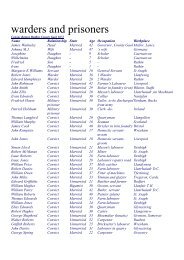pdf, 378.05 KB - Denbighshire County Council
pdf, 378.05 KB - Denbighshire County Council
pdf, 378.05 KB - Denbighshire County Council
You also want an ePaper? Increase the reach of your titles
YUMPU automatically turns print PDFs into web optimized ePapers that Google loves.
7 A Turbulent Prince: Dafydd ap Gruffudd, last<br />
Welsh Lord of Denbigh (c.1236-1283)<br />
Denbigh Castle.<br />
At dead of night on Palm Sunday eve 1282,<br />
Dafydd ap Gruffudd stormed into Hawarden<br />
Castle near Chester, snatching its English lord<br />
from his bed. Dafydd had been expected at<br />
Hawarden, but as a peaceful Easter guest: he<br />
had even sent a gift of salmon in advance. Until<br />
the moment of attack, moreover, he was a<br />
trusted ally of the English, who had made him<br />
Lord of Denbigh, Ruthin and Hope as a reward<br />
for his support against his own elder brother,<br />
Llywelyn (the Last) Prince of Wales. Nor, until<br />
that moment, did Llywelyn himself apparently<br />
know that Dafydd had - yet again - changed<br />
sides.<br />
Dafydd’s turbulent career, in fact, could scarcely<br />
be matched by the most imaginative fiction. As<br />
a child hostage in the Tower of London, he had<br />
probably seen his father plunge to his death<br />
while attempting to escape. Thereafter he had<br />
three times betrayed his brother Llywelyn, been<br />
restored to favour, and betrayed him again.<br />
Only after his attack on Hawarden sparked off<br />
King Edward I’s decisive campaign to conquer<br />
Wales did Dafydd at last remain true to Llywelyn<br />
and the cause of Welsh independence.<br />
When Llywelyn fell in battle in December 1282,<br />
Dafydd himself took the title of Prince of Wales:<br />
but within months he was a hunted fugitive. In<br />
June 1283 he was betrayed, wounded and captured<br />
‘by men of his own tongue’ - perhaps his own<br />
followers - and sent in chains to Shrewsbury.<br />
There, in October, he was convicted by an<br />
English Parliament on four charges of treason,<br />
homicide, sacrilege (because of his Eastertide<br />
assault on Hawarden) and plotting King<br />
Edward’s downfall. Accordingly he suffered<br />
fourfold execution, being dragged to the scaffold,<br />
half-hanged, disembowelled alive and then cut<br />
into quarters.<br />
‘A restless, discontented, shifty schemer’; ‘true<br />
neither to the Welsh nor the English’; ‘the ablest<br />
but most treacherous of Llywelyn’s brothers’;<br />
the verdicts of Welsh historians on Dafydd ap<br />
Gruffudd are equally harsh. Only the Dictionary<br />
of Welsh Biography has a good word to say for<br />
this last Welsh Lord of Denbigh, ‘a man of<br />
exceptional courage and personal attractiveness’.<br />
Places to visit<br />
Little survives to commemorate Prince Dafydd<br />
within modern <strong>Denbighshire</strong>: his castles at<br />
Denbigh and Ruthin were both spectacularly<br />
rebuilt by the English. Denbigh Castle open<br />
March to September, Monday to Friday 10am-<br />
5.30pm, Saturday and Sunday 9.30am-5.30pm.<br />
Daylight opening in the Winter months. Outside<br />
the district, however, there are considerable<br />
remains of the castle he constructed at<br />
Caergwrle (or Hope Castle), the last purely<br />
Welsh castle ever built: freely accessible via a<br />
footpath from Caergwrle village, some 5 miles<br />
north-west of Wrexham via the A541 to Mold.<br />
The remains of Hawarden Castle can also be<br />
seen in the grounds of the later house,<br />
Gladstone’s home (open Summer Sundays only).<br />
9




